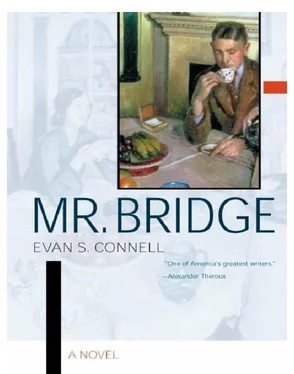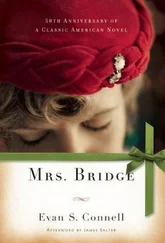Evan S. Connell
Mr. Bridge
I was the world in which I walked, and what I saw
Or heard or felt came not but from myself;
And there I found myself more truly and more strange.
… Wallace Stevens
Often he thought: My life did not begin until I knew her.
She would like to hear this, he was sure, but he did not know how to tell her. In the extremity of passion he cried out in a frantic voice: “I love you!” yet even these words were unsatisfactory. He wished for something else to say. He needed to let her know how deeply he felt her presence while they were lying together during the night, as well as each morning when they awoke and in the evening when he came home. However, he could think of nothing appropriate.
So the years passed, they had three children and accustomed themselves to a life together, and eventually Mr. Bridge decided that his wife should expect nothing more of him. After all, he was an attorney rather than a poet; he could never pretend to be what he was not.
Each morning as soon as he walked into the office he glanced at the photograph of his wife and children which stood on the desk in a silver frame. He had placed the picture exactly where he wanted it, so that it never interfered with his work but at the same time he could see the family as often as he liked. Later pictures had been taken but this one pleased him best: Ruth was five years old, Carolyn three, and Douglas was a baby. The girls were seated on the studio couch, one on either side of their mother, who was holding Douglas in her lap. The photograph was orderly, symmetrical, and serene.
One Monday morning when he entered the office he noticed that the photograph had been moved. Evidently the woman who cleaned the office over the weekend had forgotten where it belonged. He put it back where he wanted it. Then for a few minutes he remained motionless in his swivel chair and stared at the picture; and he wondered again what would have happened to him if he had never met this woman who became his wife. He felt profoundly obligated to her. It seemed to him that the existence of the family was a mysterious accomplishment to which he had contributed very little. She had done this, somehow, almost by herself. He had provided the money and he had made decisions, but these things appeared insignificant when he compared them to what she had done; and he reflected on some lines from a letter by a famous man which he had read not long after meeting her: Thou only hast taught me that I have a heart — thou only hast thrown a deep light downward, and upward, into my soul. Thou only hast revealed me to myself; for without thy aid, my best knowledge of myself, would have been merely to known my own shadow — to watch it flickering on the wall, and mistake its fantasies for my own real actions. Indeed, we are but shadows — we are not endowed with real life, and all that seems most real about us is but the thinnest substance of a dream — till the heart be touched. These lines had impressed him so that he copied them and kept them a long time; he had often been on the point of reciting them to her because they expressed his own feelings with such lucidity and tenderness.
The idea of life without her caused him to move restlessly.
Then, because it was time to begin work, he cleared his throat, blew his nose, and rang for Julia.
Occasionally he went to the bank around the corner from his office in order to look at his securities. Before going down to the vault in the basement he usually stopped to see the president, Virgil Barron, whom he had known for several years. They lived not far apart in the Mission Hills district, and both were members of a group that reserved a round table for lunch in the Terrace Grill of the Muehlebach Hotel. After visiting with Barron for a few minutes he would walk downstairs, ask for his safe-deposit box, and carry it into one of the walnut-paneled cubicles. There, after placing the long black metal box in the middle of the table, he locked the door, put on his reading glasses, opened the box, and began to examine the stock certificates and bonds.
Each bond and each stock certificate was neatly folded to fit into a business envelope. On each envelope he had listed the contents: the certificate numbers, the number of shares, the date purchased, and the amount paid. On the back of each envelope he had noted the recommendations of his broker to sell or hold, together with the date and the selling price. If he had accepted the broker’s advice and sold a particular security he made a note of this. But he seldom sold anything, because it seemed to him that if one invested in a substantial, well-managed corporation it should almost never become necessary to sell. There would be exceptions, the most prudent investor must be prepared to admit that times change; even so, as he reminded his wife every now and then in order that she should have this principle irrevocably planted in her head by the time of his death, it is better to trade too little than too much.
Frequently while he was looking through his securities — sometimes reading the italicized print which set forth the conditions, but more often gazing at the handsome heavy papers as though they were exhibits in a gallery — he would remember the bad judgment of his father, and a frown of displeasure would crease his face. Several thousand dollars had been wasted on penny gold mines, on the schemes of inventors, and similar speculations. Now there was nothing but one bulky envelope stuffed with these testimonials to folly: certificates of corporations with names like Amazon Bonanza and Del Rio Silver King, and handwritten promises to repay loans. These were folded as his father had folded them many years ago. Most of the companies were defunct and the few that existed could not be found on any exchange, and the men who had promised to repay the money were dead; but it was not much trouble to keep the documents and it might be foolish to destroy them. However, it gave him no pleasure to consider them. They angered him and left him with a feeling of embarrassment for his father’s naivete.
Otherwise, the fact that his father had left him nothing did not trouble him. An inheritance would have simplified things and it was a shame the money had been squandered; beyond that Mr. Bridge seldom thought about it. And in one respect he intended to benefit by the foolishness of his father: he would not repeat his father’s error.
So he bought shares in companies that he considered essential. Metropolitan public utilities seemed the safest because their services were indispensable and their monopoly was guaranteed; but he had also bought into several food and drink corporations with long records of uninterrupted dividends, and he had bought small amounts of somewhat more speculative companies such as American Tobacco and the Union Pacific Railroad. All of these, he thought, were manifestly solid concerns, and during periods of fluctuation on the stock exchange he observed with pleasure and satisfaction the stability of his investments.
He had said to his wife: “When the time comes, India, that you are alone, do not sell these stocks. These are sound corporations with fine records and they will not let you down.”
She had promised to keep them and to pass them along to the children.
He had said to her: “These securities are worth a nice little sum of money today. They ought to be worth a great deal more in years to come.”
Ordinarily he brought with him the latest issue of the Wall Street Journal and spent some time jotting down current prices on a scratch pad in order to calculate the value of his holdings; then he would consider the provisions of his will and ask himself whether a few changes should be made. At present almost everything had been assigned to his wife, yet perhaps this was not the wisest policy. Might it not be wiser to apportion the stocks: a certain number of shares to each of the children upon his death, the remainder to her. Naturally this would reduce her income, which was most important, but at the same time the children would be given a degree of independence. Thirty shares of American Tobacco, for instance, might be willed to each of the children, thus providing them with a quarterly check. Or the entire Tobacco holding might go to Ruth, an equivalent holding of General Foods to Carolyn, and some shares of Bethlehem Steel to Douglas. Or, because the dividend was liberal, it might be best to leave Bethlehem in the name of Mrs. Bridge. Douglas, being young, might be better endowed with a stock that displayed a somewhat more favorable growth pattern. These were things to be considered.
Читать дальше












